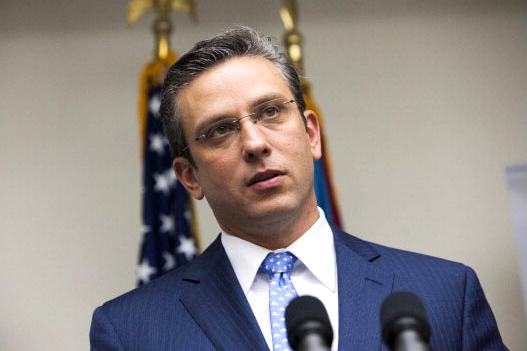Puerto Rican debt 'unpayable' as country's economy stuck in 'death spiral', says Governor
Puerto Rico follows Greece as the second country unable to repay its public debt in another blow to the world financial system this week

The Governor of Puerto Rico, Alejandro García Padilla, has announced that the country will not be able to pay its £46 billion ($72 billion) of debt.
The news was confirmed in a public announcement by the Governor on Monday. The price of Puerto Rico’s bonds dropped during the day following the announcement, with some declining as much as 12 per cent.
"The debt is not payable” Governor García Padilla said in an interview with the New York Times. “There is no other option. I would love to have an easier option. This is not politics, this is maths."
The Governor said that Puerto Rico's economy is in a vicious "death spiral" and that it must either defer payments of its debt for as long as five years or seek concessions from many of its creditors, or both.
The creditors, most of whom are from the US, must negotiate or else they "will be shooting themselves in the foot", the Governor said.
As a US commonwealth territory, Puerto Rico – like the 50 states – cannot declare banctruptcy under federal law.
In June last year Governor García Padilla proposed the Puerto Rico Debt Enforcement and Recovery Act which was passed by the Legislative Assembly in one day and would allow the country to default on its debt, which equates to nearly 70 per cent of its expenditure.
However, on 6 February this year, Judge Francisco Besosa of the US District Court in Puerto Rico struck down the new law.
It is possible for US states to declare sub-sections of their government, like utilities or municipalities, bankrupt and for whole municipalities to file for bankruptcy under Chapter 9 of the Federal Bankruptcy Code.
Cities such as Detroit, Michigan and Stockton, California followed this route last year, allowing them to reorganise their debt while paying back some money to creditors.
This is not currently an option, however, for US commonwealth territories such as Puerto Rico.
Economic analyts from the Wall Street Journal estimate that the Puerto Rican government will run out of money as soon as July which could leave to a government shutdown and further crisis.
An unconfirmed report from former IMF economists which was released today, said that "a crisis looms" for the commonwealth. "Structural problems, economic shocks and weak public finances have yielded a decade of stagnation, outmigration and debt", the report said.
The report, which was commissioned by the Government Development Bank, called for a full-on approach to the situation which addresses together the "faltering economic activity, faltering fiscal and debt sustainability, and faltering policy credibility".
Puerto Rico has had a struggling economy since the 1970s and the government has operated in deficit for the last 15 years. The country has also suffered a depletion in its workforce and tax base due to mass emigration and an aging population. Out of the 3.6 million people who remain living on the island, only 1 million people have a steady job.
Subscribe to Independent Premium to bookmark this article
Want to bookmark your favourite articles and stories to read or reference later? Start your Independent Premium subscription today.

Join our commenting forum
Join thought-provoking conversations, follow other Independent readers and see their replies